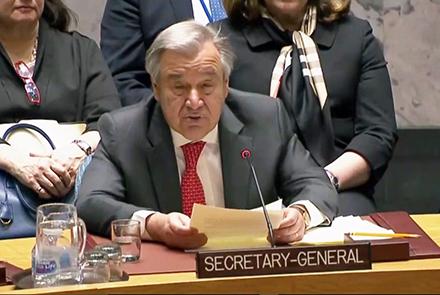The United Nations Secretary General António Guterres said on Friday at a Security Council meeting that there was the need for greater cooperation among Central Asian countries to achieve peace, sustainable development and prosperity in Afghanistan.
Also addressing the meeting titled “Building regional partnership in Afghanistan and Central Asia as a model to link security and development” a US representative sent out a strong message to Pakistan and other regional countries not to support insurgency.
He said directly to Pakistan that it would be in their interests to border a peaceful, stable and prosperous Afghanistan.
The secretary general said however that the security situation in Afghanistan continues to be fragile and volatile, with an increase in the activities of well-known “radical terrorist groups”, including in the northern parts of the country. He said this threatens the security of the region and beyond and that insecurity hampers the growth of the Afghan economy.
He welcomed the commitment by Central Asian countries to develop long-term cooperation with Afghanistan and promote major development projects including the Turkmenistan-Afghanistan-Pakistan-India pipeline and power supply projects.
“Several cross-border initiatives are now being planned or are under way, including the Central Asia-South Asia power project, a natural gas pipeline from Turkmenistan through Afghanistan to Pakistan and India, and a new power transmission line from Uzbekistan to Afghanistan.
“The United Nations family stands ready to support these initiatives and others that can bring greater investment and prosperity to this region,” Guterres said.
He stated that it was critical to integrate the economies of Afghanistan and neighboring countries through enhanced interaction and connectivity by implementing regional infrastructure, trade, investment, transit and transportation projects.
He also drew attention for the need for the region to deal with water sharing and security issues.
Addressing the council Kazakh Foreign Minister Kairat Abdrakhmanov, who chaired the meeting, said the new US strategy for Afghanistan will contribute towards ensuring long-term peace in the country.
He said the UN Security Council delegation's recent visit to Afghanistan identified a number of solutions to ongoing problems and that one such solution was to see a united front among Central Asian countries especially in terms of pursuing long-term projects with Afghanistan.
He said such cooperation would forge peace and stability in the country, adding that joint efforts were needed to counter terrorism.
He also said that a coordinated and transparent approach is necessary to maximize efficiency of work by the United Nations in Central Asia and Afghanistan.
Abdrakhmanov stated that the delegation that visited Afghanistan was confident that Afghanistan can become a peaceful and prosperous nation.
Kuwait’s Deputy Prime Minister Mohammad Sabah Al-Salem Al-Sabah also addressed the council and said his country continues to support all agencies working to secure peace in Afghanistan.
He also called on all Central Asian countries to strengthen security cooperation in the region and said Afghanistan should not be seen as a threat but rather considered a key partner to secure peace.
Sergey Lavrov, Russia’s Minister of Foreign Affairs, stated Russia has stepped up efforts to help Afghanistan secure peace and stability and that Moscow feels dialogue is needed to attain peace – adding his country was ready to facilitate any such talks.
He raised concerns however about what he said was a growing footprint of insurgents in the northern parts of Afghanistan, including Daesh, and called for efforts to be stepped up to stop drug trafficking in Afghanistan, which he said was funding and fueling the war.
He went on to say that the significant progress has been made against Daesh in eastern Afghanistan but says ultimately to prevent Daesh from spreading through the region, strength in regional unity is critical.
He also stated that peace will not be won on the battlefield but will only be reached through dialogue. Says Afghan govt has shown it wants dialogue with the Taliban but that this sentiment has not been reciprocated.
He made it clear that the US would not let Afghanistan become a safe haven to terrorists again.
Afghanistan’s Deputy Foreign Minister Hekmat Khalil Karzai also addressed the UN Security Council and said the meeting was an important initiative on an issue of strategic relevance for peace and stability in Afghanistan and the wider region.
“The high-level representation in this meeting signifies a personal commitment to the imperative of securing lasting peace and stability in my country, for which we are deeply grateful,” he said.
Speaking on the Security Council delegation’s recent trip to Afghanistan he said the visit was an opportunity to discuss a number of important issues, ranging from security, development and regional cooperation; to governance, human rights, and democratization.
“We are confident the outcome of the visit will factor positively in strengthening the international community’s engagement, cooperation and consensus on Afghanistan.
“One issue that was highlighted in the visit concerns the topic on which we are meeting today: that Afghanistan’s stability and development should not be seen in isolation from the security and stability of the countries in our periphery and beyond.
“In this regard, the imperative of deepened cooperation between Afghanistan and Central Asian States on common challenges and promoting our shared prosperity has gained new impetus,” he said.
He stated that prosperity is not possible in the absence of security and that terrorism and violent extremism lie at the forefront of the inter-linked challenges threatening Afghanistan’s security and stability and that of the region.
“Our fight against terrorism is being conducted on behalf of the region and the world at large. In this struggle, we are making enormous sacrifices, in terms of human lives - ordinary civilians and our security forces alike.
“Despite all challenges, our forces have made progress in pressing violent militants and terrorists, including the Taliban; the Haqqani network; Al-Qaeda and Daesh, and the Islamic Movement of Uzbekistan, among others.
“We are pleased to note that the imperative of addressing the problem of regional terrorist sanctuaries and safe-havens is now recognized more than ever before,” he said.
He also said the region needs to stand together to overcome the problem of illicit drugs.
We have engaged in comprehensive efforts to improve security and defeat terrorism. Outside the scope of military efforts, we are working to ensure success in our peace efforts with elements of the armed opposition, he said.


